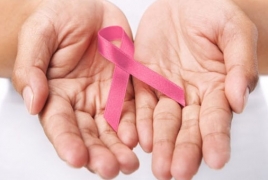MRIs could help find cancer in women with dense breast tissue November 28, 2019 - 12:02 AMT PanARMENIAN.Net - Getting an MRI in between regular mammogram checkups could be an effective way for women with extremely dense breast tissue to learn whether they have cancer, CNN reports citing a new study. Women who have extremely dense breast tissue have a higher risk of breast cancer. The density of the tissue makes it difficult to detect the cancer with traditional mammography. That's because dense tissue appears white on a mammogram and it's hard for the radiologist to see through it when they read your scan. Nondense or fatty tissue appears black, and it is easier to distinguish between healthy tissue and cancer. About 1 in 10 women are considered to have extremely dense breast tissue. More than half of women over the age of 40 in the United States have what's considered dense breasts, according to the US Food and Drug Administration. It's unclear why women have this kind of tissue. Often, it's inherited, but other factors can influence tissue density. Typically, women with extremely dense breasts tend to be fitter or have a lower BMI; they are often younger and may be taking hormone therapy to ease their menopause symptoms. The study, published in The New England Journal of Medicine on Wednesday, found that using supplemental MRI screening in this patient population with extremely dense breast tissue, and who had normal results with mammography, saw significantly fewer interval cancers than the women in the study who were assessed using mammography alone during a two-year screening period. Interval cancers are the cancers detected within 12 months after a mammographic screening in which findings are considered normal, essentially in the interval between scheduled screenings. There was a 50% lower rate of interval cancers among the women in the MRI group. Among those who underwent a biopsy, 26% had breast cancer. Specifically, the interval-cancer rate was 2.5 per 1,000 screenings in the MRI group, compared to 5.0 per 1,000 screenings in the mammography-only group in the study. The research was done among more than 40,000 women in the Netherlands who were between the ages of 50 and 75. They were randomly assigned to either a group that received standard screening or a group that received additional MRI screening. Azerbaijani authorities report that they have already resettled 3,000 people in the Nagorno-Karabakh town of Stepanakert. On June 10, Azerbaijani President of Azerbaijan Ilham Aliyev will leave for Turkey on a working visit. Azerbaijani President Ilham Aliyev arrived in Moscow on April 22 to hold talks with Russian counterpart Vladimir Putin. Authorities said a total of 192 Azerbaijani troops were killed and 511 were wounded during Azerbaijan’s offensive. Partner news |